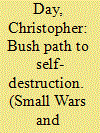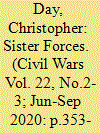| Srl | Item |
| 1 |
ID:
142609


|
|
|
|
|
| Summary/Abstract |
This article explains the demise of Sierra Leone's Revolutionary United Front (RUF) rebellion. It argues that the main cause of this fate was the group's relationship with its primary sponsor, Charles Taylor. The RUF's dependency on Taylor's patronage, coupled with the rebellion's weak organisational endowments harmed the group's prospects of success. Based on original research, the article shows how Taylor used the RUF as a strategic instrument for his own regional interests, which led to the group's unravelling. More broadly, the article speaks about proxy warfare in Africa and how the relationship between resource flows and rebellion are not always beneficial to rebels as one might expect.
|
|
|
|
|
|
|
|
|
|
|
|
|
|
|
|
| 2 |
ID:
172854


|
|
|
|
|
| Summary/Abstract |
Relations between African militaries, civilian authority and the public have undergone significant transformation over the past decades. Much of previous scholarship on civil-military relations tended to approach the subject through the idiom of the coup. Analysts in the 1960s initially presented the military in positive terms as a modernising agent, a representation cast aside in the throes of coups d’état, instability and rights violations at the behest of armed forces. This article revisits the conceptual and theoretical terrain in light of recent socio-political changes and in the wake of the peak of military coups on the continent. In reconceptualising civil-military relations, this article proposes a typology that combines the nature of modal relations with civilian authority and relations with the civilian public. The article analyses the different models of relations, tracing the domestic reconfigurations and external influences that structure news ways of civil-military engagement.
|
|
|
|
|
|
|
|
|
|
|
|
|
|
|
|
| 3 |
ID:
172853


|
|
|
|
|
| Summary/Abstract |
The military is a central component of the state and society with implications for statehood and social stability. Since independence, Africa has grappled with contentious and contradictory roles of armed forces whether they be part of or against the state. Much of the early scholarship on the role of the military tended to paint a positive picture, presenting it as a critical pillar and an agent of modernisation for the newly independent states. This was to change drastically in the era of routine and rampant coups d’états and proliferation of organised rebel activities. But the continent has undergone significant changes since the end of the Cold War. This introduction highlights some of the major changes at the centre of transformations in relations between African militaries and civilian authorities and the public. The overall focus of the introduction, and the entire special issue, is to reposition the theoretical and conceptual aperture for analysing civil-military relations in Africa.
|
|
|
|
|
|
|
|
|
|
|
|
|
|
|
|
| 4 |
ID:
172851


|
|
|
|
|
| Summary/Abstract |
In many African states, park rangers perform a variety of roles as armed state actors. Facing the overlapping challenges of wildlife management and regime security, many have become increasingly militarized, with significant degree of variation. Using case studies from Uganda, Rwanda, Democratic Republic of Congo, and South Sudan, this article provides an expanded conceptualization of militarization that configures two characteristics of Africa’s park rangers: 1) their integration into or insulation from the state security apparatus, and 2) their coercive roles of either law enforcement or combat. The article builds an argument that takes into account colonial institutions and civil-military relations.
|
|
|
|
|
|
|
|
|
|
|
|
|
|
|
|